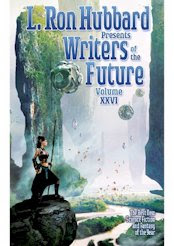 The story recommendation of the week goes to Jason Fischer for "The House of Nameless," from Writers of the Future, Volume XXVI.
The story recommendation of the week goes to Jason Fischer for "The House of Nameless," from Writers of the Future, Volume XXVI.Since I learned I would be in Writers of the Future, Volume XXVII I've been reading stories from previous volumes, and let me tell you it is an ego-expanding experience. Most of these stories are really good! The story concepts are almost always terrific, and the writing is generally at a high level. Certainly some of the stories seem flawed to me, but even with those it is easy to spot the qualities that impressed the judges. Historically, the Writers of the Future Contest has produced many top-notch professional authors, and I am certain that will hold true for several of the past couple years' winners.
Last year's anthology, Writers of the Future, Volume XXVI, includes a number of tales that impressed me very much, especially the stories by Alex Black, Simon Cooper, Tom Crosshill, Jason Fischer, Laurie Tom, and Brad R. Torgersen. (I hope no one will take that as a negative comment on any winners I haven't mentioned -- as I said, even in the stories that don't work for me personally, the authors' talents are obvious; you don't rise to the top of a pile of several hundred submissions without some skills.)
Of all these excellent stories, my personal favorite is "The House of Nameless" by Jason Fischer, a strikingly original piece written at a very professional level. Told from the point of view of Raoul the Minotaur, "The House of Nameless" shows a struggle between various powerful gods, but it is not quite like any such story you have read before. The gods inhabit a bizarre and pliable universe, and most of them are determined not to return to the universe we know, which they refer to as the "One-Way-World." Key to the struggle over whether to return to the One-Way-World is the god "Nameless," who was deprived of his identity in punishment for a serious crime he is expected to commit some day.
Fischer does a wonderful job of blending bizarre story devices with anachronistically mundane elements:
But there was enough vinegar left in the old god to keep the ship at bay. Try as it might, The Cheerful Misogynist was grounded, straining against Yahweh's invisible hand.This story is great fun to read all the way through. "The House of Nameless" sheds funny or thought-provoking concepts at breakneck speed -- given the level of detail, I am not surprised to see that Fischer has written other work in this universe. The spirited pace does not not allow for elaborate characterization (which I suspect is why this story did not win the Gold Award for last year's contest -- Laurie Tom's "Living Rooms" focuses more on the main character and her emotional struggles), but the gods involved are quirky enough that they don't blend together.
Raoul and the others were out, rappelling down ropes or gliding on dreamt-up wings. There were enough holes in Yahweh's fence that they could slip through on foot.
Imogen was back to khakis and a T-shirt, and for some reason had the remote control for Raoul's entertainment center in her hand.
Like all WOTF winners, Australian Jason Fischer is new to the field, but already he has appeared in numerous publications, including Apex, Aurealis, Andromeda Spaceways Inflight Magazine, among many others, and he has been nominated for the Ditmar and Aurealis Awards among other honors. I believe he has a long and successful writing career ahead of him.



